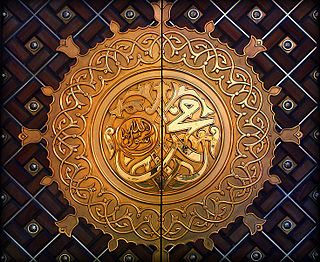Islamic republic is the name given to several states or countries ruled by Islamic laws.
Islamic republic may also refer to:
The term Islamic republic has been used in different ways. Some Muslim religious leaders have used it as the name for a form of Islamic theocratic government enforcing sharia, or laws compatible with sharia. The term has also been used for a sovereign state taking a compromise position between a purely Islamic caliphate and a secular, nationalist republic.
Balochi, sometimes spelt in various other ways, may refer to:
Nur or NUR may refer to:
Navid or Naveed may refer to:
An Islamic state has a form of government based on sharia. As a term, it has been used to describe various historical polities and theories of governance in the Islamic world. As a translation of the Arabic term dawlah islāmiyyah it refers to a modern notion associated with political Islam (Islamism). Notable examples of historical Islamic states include the state of Medina, established by the Islamic prophet Muhammad, and the Arab caliphate which continued under his successors and the Umayyads.
Baqi may refer to:
Yusuf is a male name meaning "God increases". It is the Arabic equivalent of the Hebrew name Yosef and the English name Joseph. It is widely used in many parts of the world by Arabs of all Abrahamic religions, including Middle Eastern Jews, Arab Christians, and Muslims.
Badr as a given name below is an Arabic masculine and feminine name given to the "full moon on its fourteenth night" or the ecclesiastical full moon. Badr may refer to:

Muhammad, also spelled Muhammed, Muhamad, Mohammad, Mohammed, Mahammad, Maxammed, Mehemmed, Mohamad, Mohamed, or in a variety of other ways, is an Arabic given male name meaning 'praiseworthy'. The name comes from the passive participle of the Arabic verb ḥammada (حَمَّدَ), meaning 'to praise', which itself comes from the triconsonantal Semitic root Ḥ-M-D. Believed to be the most popular name in the world, by 2014 it was estimated to have been given to 150 million men and boys.
Ira or IRA may refer to:

The following outline is provided as an overview of and topical guide to Afghanistan:
Karam may refer to:
Afghan or Afgan may refer to:
Iran, officially the Islamic Republic of Iran, is a country in Western Asia.
Islamic state may refer to historical polities or theories of governance in the Islamic world or to a modern notion associated with political Islam.
Al-Ghani or Ghani means generous or bountiful in Arabic and is one of the names of God in Islam.
Capital punishment for offenses is allowed by law in some countries. Such offenses include adultery, apostasy, blasphemy, corruption, drug trafficking, espionage, fraud, homosexuality and sodomy not involving force, perjury causing execution of an innocent person, prostitution, sorcery and witchcraft, theft, treason and espionage. In addition to civilian treason and espionage, often considered capital crimes against the state where the death penalty is retained, military laws frequently ordain execution for serious offences, including in jurisdictions where capital punishment is illegal or obsolete under civilian law.
Mohammad Qasim or Mohammed Qassem may refer to: